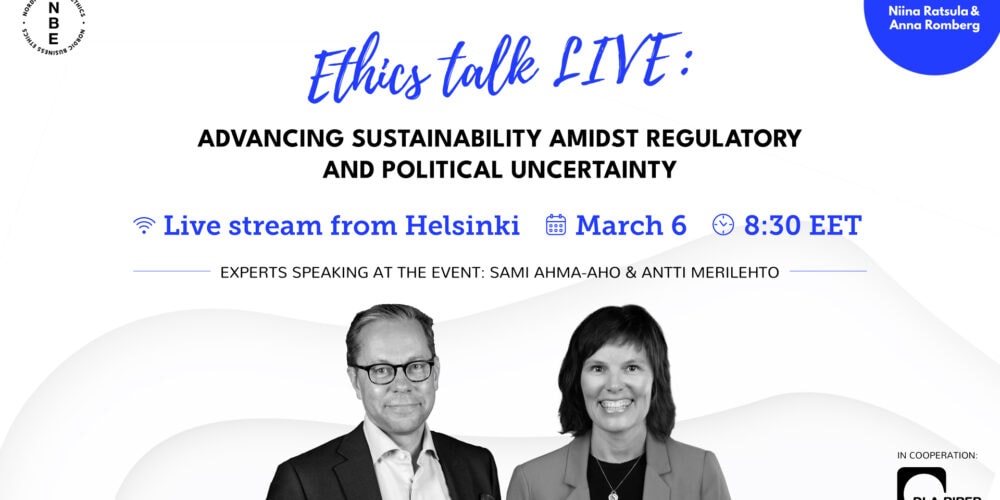EthicsTalk LIVE: The State of Compliance in Nordic Organisations 2023
This blogpost summarises the key takeaways from the event held on November 22nd 2023. The panelists included Suzanne Innes-Stubb, VP Global Compliance at Kone Corporation, Satu-Anneli Kauranen, Senior Counsel at DLA Piper and Anushka Ram, Director at Forensic Risk Alliance. More information on the panelists on the event page.
Positive trends in the numbers of E&C professionals
The survey shows a positive trend when it comes to the increasing number of Ethics & Compliance (E&C) professionals working in Nordic-based companies. Also, professional diversity among E&C professionals has increased. Yet many companies focus their recruitment on anti-bribery and anti-corruption specialists although the huge volume of new Environmental, Social, and Governance (ESG) rules and requirements would benefit more expertise in those areas. More attention must be given to human rights issues, as well as social and environmental sustainability aspects in businesses’ compliance efforts.
All panelists agreed that even though progress have been made, Nordic compliance programmes lag behind Western European, United Kingdom’s and especially United States’s programmes as the Department of Justice’s (DOJ) Guidance is not regularly used as a benchmark. As Satu-Anneli said it: “we are not quite there yet, but luckily the survey also shows that we are getting there.”
We are not quite there yet, but luckily the survey also shows that we are getting there.
Satu-Anneli Kauranen, DLA Piper
Improvements required in measuring effectiveness
When it comes to measuring the effectiveness of companies’ E&C efforts, there is notable room for improvement in Nordic-based companies’ E&C activities. Most companies have a compliance program, but still only two-thirds of them evaluate the effectiveness of those efforts. E&C efforts play a vital role not only in mitigating risks but also detecting and investigating potential misconduct and preparing the companies for future compliance challenges. There is no one-size-fits-all solution to measuring effectiveness, as it is important to select methods that suit the particular company and its compliance programme.
Satu-Anneli encourages E&C teams to evaluate the effectiveness of E&C programs in their organizations, emphasizing engaging training for employees to manage ethical and compliance challenges. Given the expanding scope of E&C work, covering areas like anti-bribery, anti-corruption, anti-money laundering, competition laws, ESG and more, it’s advisable to prioritize and address tasks that are more urgent considering the company’s needs. AI-tools can be cost-effective and valuable for audits and investigations. Suzanne also highlighted that at Kone, they have found collaboration with internal audit (assurance), internal control and risk management to be very effective. All these teams look at the same issues from different angles and that adds value. She also wants to do more compliance risk assessments, that have brought up some surprises. Suzanne also adds that external impact assessments to their net risks have helped them to see the areas where there is more to be done.
On independence, trainings and incentives
When discussing the access to the board, the panellists highlighted that having no independent access may not be as bad as it sounds, if there is no censorship. Company culture, management’s interest level, compliance officers’ place in hierarchy and true independence paint a more clear picture of the situation.
E-learning appears to be the prevalent method for integrating the Code of Conduct into daily operations and for training employees. Based on the survey, only a minority of Nordic companies provide in-person E&C training to all employees. Training sessions where the participants feel comfortable contributing to the training lead to more efficient and permanent results in observing E&C issues and following the rules.
Why should I pay someone to do what they should be doing anyways?
Anushka Ram, FRA
Anushka ended the discussion on incentives by asking “why should I pay someone to do what they should be doing anyways?” She believes that when people do have goals that are part of their performance reviews, they start unconsciously having an ethical mindset, that in the long run benefits everyone.
If you want more of the same topic, make sure you watch the webinar recording from Nordic Business Ethics’ YouTube channel.



